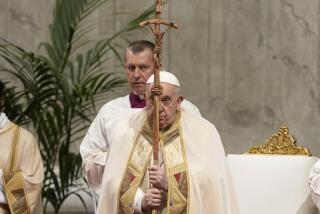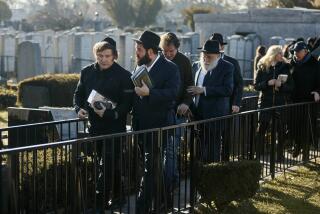1 1/2-Hr. Meeting With Pope Clears Air: Jewish Leaders : Waldheim, Israel Issues Unresolved
- Share via
CASTEL GANDOLFO, Italy — Pope John Paul II conducted unprecedented talks with Jewish leaders at his summer home here today, calming the storm in Catholic-Jewish relations that erupted with worldwide Jewish outrage when he received Austrian President Kurt Waldheim in June.
After nearly 1 1/2 hours of what was described as “friendly, timely, positive and fruitful” open discussion, members of both the papal delegation and the nine-member Jewish delegation said there was significant progress in resolving Jewish concerns about the Vatican’s position on the Nazi Holocaust and anti-Semitism.
But two subjects of great concern to many Jews--the pontiff’s reception of Waldheim as a man of peace despite his Nazi past and the Vatican’s failure to recognize diplomatically the state of Israel--were not resolved, according to the participants and to a joint communique issued at Vatican City later in the day.
“We agreed in our discussion to disagree agreeably,” quipped Rabbi Gilbert Klaperman, president of the Synagogue Council of America, who along with other members of the Jewish delegation stressed the friendly and cooperative spirit of the meeting with the Pope and of preparatory meetings with other Vatican officials Monday and earlier today.
‘Dismay and Concern’
The communique summarized the disagreement by saying: “The Jewish delegation expressed its dismay and concern over the moral problems raised for the Jewish people by the (Waldheim) audience (with the Pope). The Catholic delegation acknowledged the seriousness of and the Church’s sensitivity to those Jewish concerns, and set forth the serious reasons behind the judgment of the Holy See (to receive Waldheim).”
Rabbi Marc H. Tanenbaum, director of international relations for the American Jewish Committee, said that John Paul “listened carefully and patiently” to the delegation’s complaints but that “he did not respond concretely to the Waldheim question.”
Likewise, there was no agreement on the issue of diplomatic relations with Israel. “He didn’t respond explicitly other than to speak the word, ‘Israel,’ with a certain affection,” Tanenbaum said.
The most significant advance reported from the Vatican and the papal talks was a Church commitment to prepare what the communique called “an official Catholic document on the Shoah (Holocaust)” including “the historical background of anti-Semitism and its contemporary manifestations.”
The document will form a basis for church teaching throughout the world and will be drafted with the aid of Jewish scholars, a step on the part of the Church that has no modern precedent.
Rabbi Mordecai Waxman, chairman of the International Jewish Committee for Interreligious Consultations and head of the delegation, said the Vatican’s willingness to state its position on the Holocaust and anti-Semitism clearly showed “a great sensitivity” to longstanding Jewish feelings that elements of the Church have been insensitive to the uniqueness of Jewish extermination by the Nazis.
“The Pope was very responsive to the idea of a major document dealing with the Nazi Holocaust, the historic demonic forces that led to the breakout of the Holocaust and also to anti-Semitism and all the forces that come into it,” Tanenbaum said.
More to Read
Sign up for Essential California
The most important California stories and recommendations in your inbox every morning.
You may occasionally receive promotional content from the Los Angeles Times.













